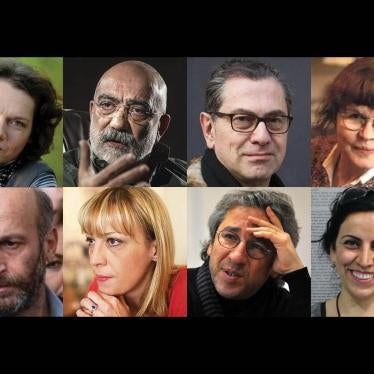(August 20, 2001) In a 17-page memorandum released today, Human Rights Watch documented Uzbekistan's campaign against independent Muslims, which has involved the arrest, torture, and sentencing of thousands of pious Muslims who practice their faith outside state controls.
Last week the U.S. Commission on International Religious Freedom released its list of recommendations to the Bush administration for countries of particular concern; it did not include Uzbekistan. The administration is slated to make its decision in early September.
On the same day the commission issued its decision, nine men were sentenced by a Tashkent court to prison terms ranging from 8 to 16 years for membership in an unregistered Muslim group. At least 43 people are currently on trial in Tashkent for similar offenses.
"These people were singled out for nothing more than the peaceful expression of their religious beliefs," said Elizabeth Andersen, executive director of the Europe and Central Asia division of Human Rights Watch. "If the Bush administration doesn't name Uzbekistan, it signals to the government and other countries in the region that the U.S. is willing to tolerate this kind of persecution."
Under the 1998 International Religious Freedom Act, countries whose governments engage in serious violations of religious freedom can be named countries of particular concern for religious freedom. The law offers the president a menu of options for dealing with such countries, ranging from limiting certain kinds of assistance to full sanctions.
The Human Rights Watch memorandum is based on more than 800 individual cases of religious persecution documented by the group since 1999. In the overwhelming
majority of cases, victims were singled out for their nonviolent religious practices or affiliations: they prayed in mosques not run by the government, belonged to Islamic groups not registered with the government, possessed or distributed Islamic literature not generated by the government, were affiliated with disgraced imams, or met privately for prayer or Islamic study. Sentences for such crimes range from 15 to 20 years in prison. The memorandum also includes a list of independent Muslims who died in custody in the past three years, apparently due to torture.
Among those convicted in the past 12 months was Imam Abduvohid Yuldashev, who was tortured during five months of incommunicado detention and then sentenced to 19 years in prison, primarily on the allegation that lessons he gave on the Koran and other Islamic texts while serving as a state-appointed imam were actually lessons in "fundamentalism." Authorities earlier subjected the imam's wife to a series of hate rallies, reminiscent of the Stalin era, publicly denouncing her as an "enemy of the people." They threatened to arrest her if she did not remove her headscarf, a symbol of her piety.
In recent months, the authorities have begun to arrest women. In March 2001 police arrested Rahima Akhmedalieva, the wife of an imam who had fled the country fearing arrest. They kept her, a mother of three, in custody in the basement of Tashkent police headquarters, and have refused to release her until her husband surrenders to police. Five months later, she remains a hostage in police custody.
"The commission's failure to recommend Uzbekistan is utterly incomprehensible," said Andersen. The commission's recommendations for countries of particular concern included Iraq, Iran, Sudan, Burma, China, North Korea, Turkmenistan, Laos, and Saudi Arabia.
In previous years the U.S. administration for the most part designated as countries of particular concern those that already fell under U.S sanctions, leading many to view the list as serving political purposes rather than the promotion of religious freedom.
"Here's a chance for the Bush administration to restore the credibility of the religious freedom act," said Andersen.








